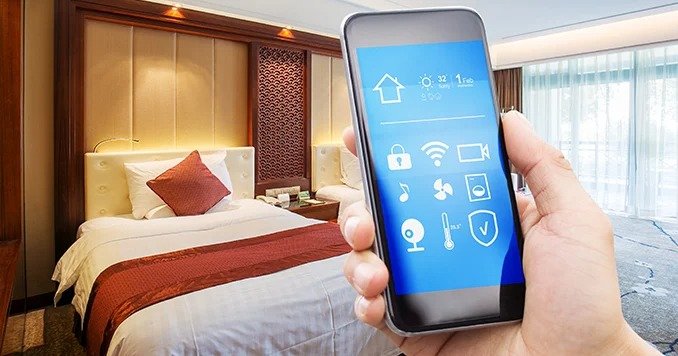Hotels across the globe are rapidly transforming the guest experience with smart technology, according to a new annual report covering more than 450 properties worldwide. From booking to check-out, hotels are integrating modern innovations that are making rooms smarter, while many guests are struggling to keep up.
One of the standout changes is the introduction of verbal tech walk-throughs during check-in, now offered by nearly half of hotels. These sessions guide guests through in-room features like smart lighting, Wi-Fi, and entertainment systems, easing the transition into more technology-driven stays.
Industry leaders note that the strongest investment trend is “ComfortTech” — practical, comfort-enhancing innovations such as smart fans, customizable lighting, energy-saving systems, and streaming-ready smart TVs. Unlike earlier futuristic experiments with robots, hotels are increasingly focusing on user-friendly solutions that improve day-to-day comfort.
Despite the digital shift, the survey highlights that 70% of guests still prefer speaking with a person, particularly during check-in or when seeking assistance. Hotels acknowledge that face-to-face service remains irreplaceable, reinforcing the idea that technology should enhance rather than replace human interaction.
The report also points to growing interest in AI-powered concierge services, voice-activated room controls, and even robot chefs. Hotels.com is keeping pace with these trends, rolling out intuitive booking tools such as automated price alerts and AI filters to streamline the reservation process.
Melanie Fish, vice president of global public relations at Hotels.com, said: “From smart showers to room service-delivering robots, this year’s survey shows hotels are using technology in ways that range from functional to futuristic. There’s a sweet spot: intuitive, personalized, but still easy to navigate.”
Bathroom innovations are also making waves. Smart mirrors with weather updates, digital temperature controls, motion-sensor faucets, and smart shower heads that change color to track water usage are becoming more common. Japanese toilets, smart bidets, and accessibility features like lowering bathtubs for wheelchair users are also gaining traction.
Yet, as hotel technology evolves, many guests are facing challenges. Hotels report that the most common issues involve lighting systems, Wi-Fi connectivity, entertainment setups, and air conditioning. To close this gap, more than half of hotels now offer verbal walkthroughs, ensuring guests can enjoy the tech without frustration.
Some properties admit to scaling back on overly complex automation, such as lobby robots or automated breakfast service, citing a preference for simplicity and genuine hospitality. As one hotel partner put it: “Warm, personalized service fosters real connections and allows us to address guest needs with empathy and care.”
Looking ahead, hotels are eyeing bold innovations ranging from real-time translation tools and robotic staff to voice-controlled sleep monitoring devices and advanced smart mirrors. Energy-saving automation and AI-powered concierge services remain high on the priority list as properties work to balance personalization, efficiency, and sustainability.
The survey makes one point clear: while smart hotel rooms are here to stay, the future of hospitality will depend on blending intuitive technology with the timeless value of human connection.







